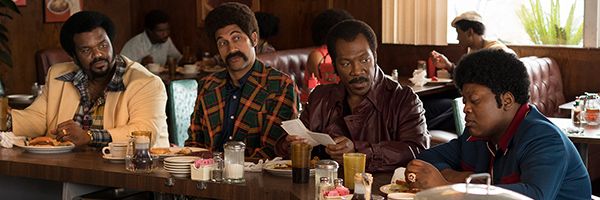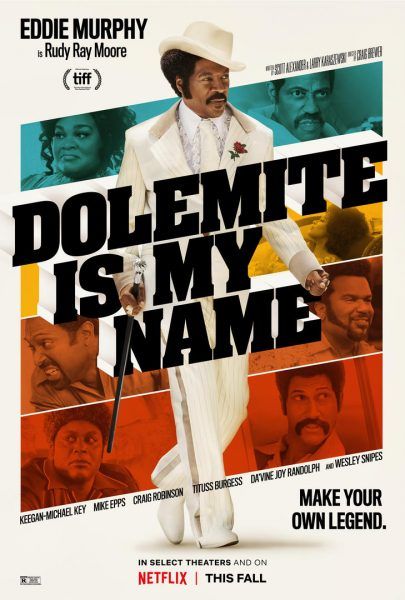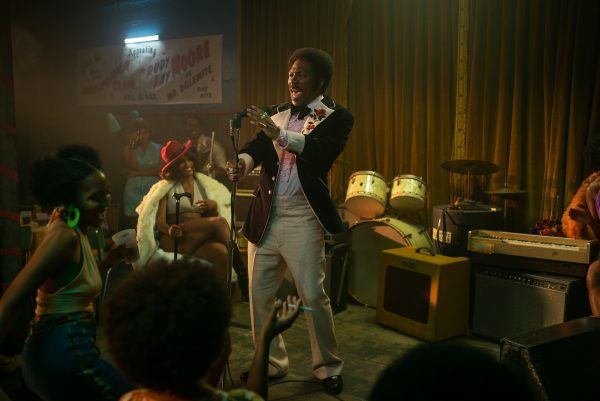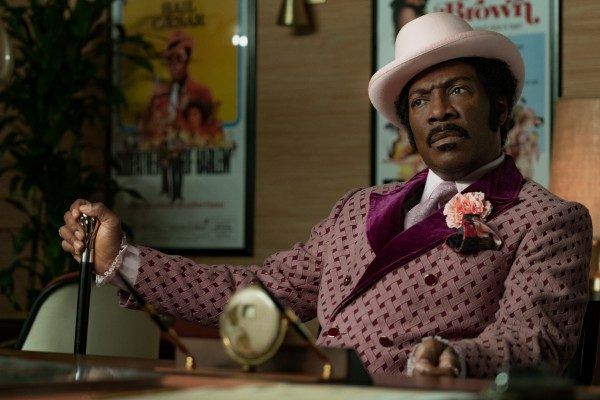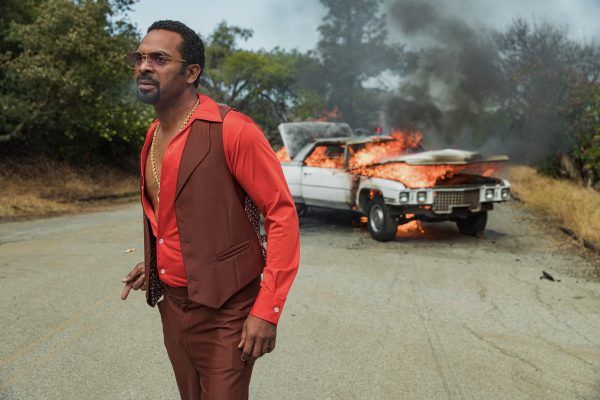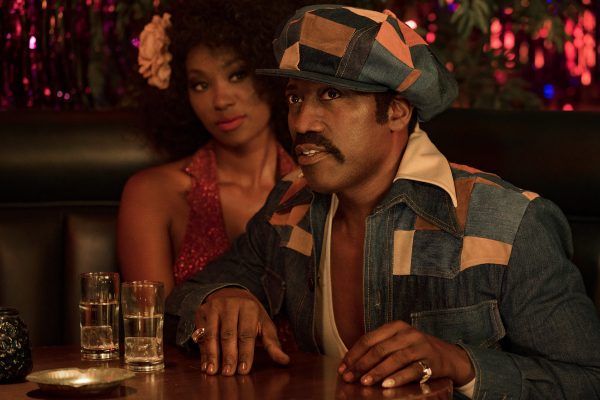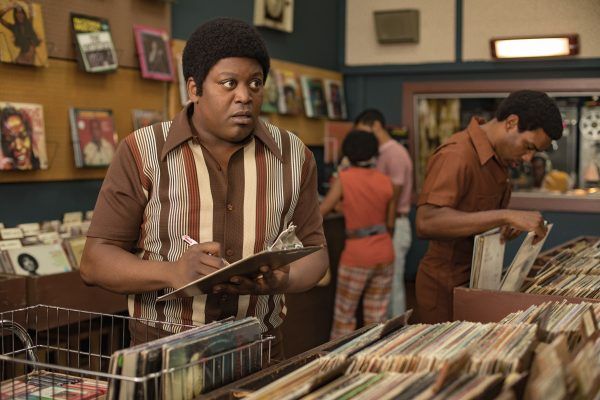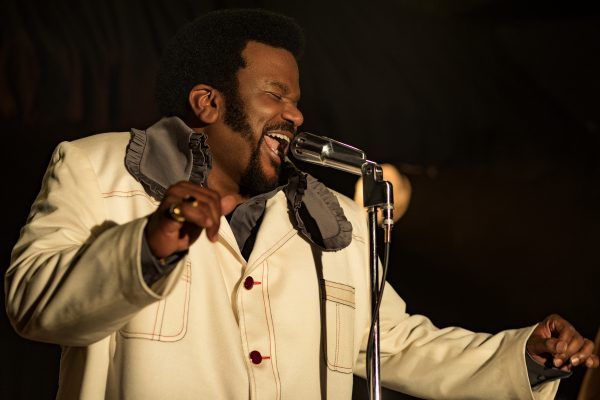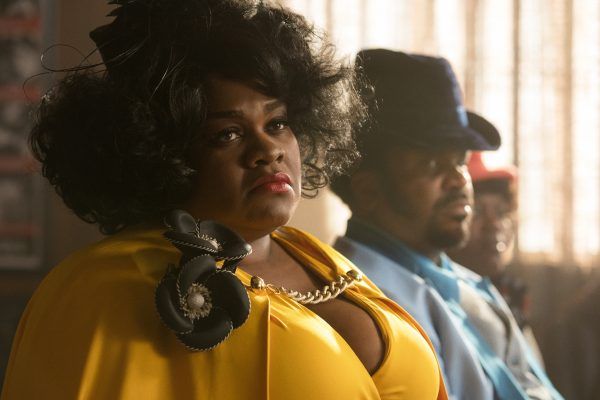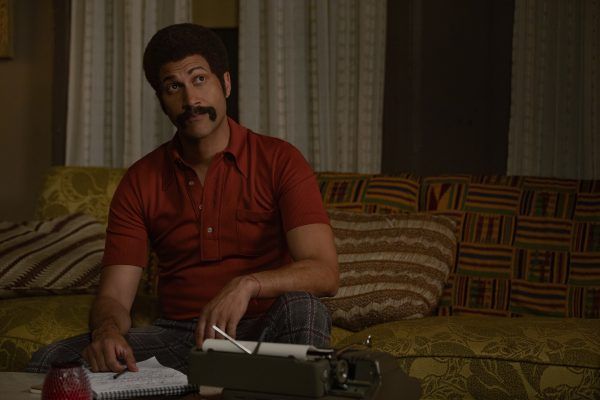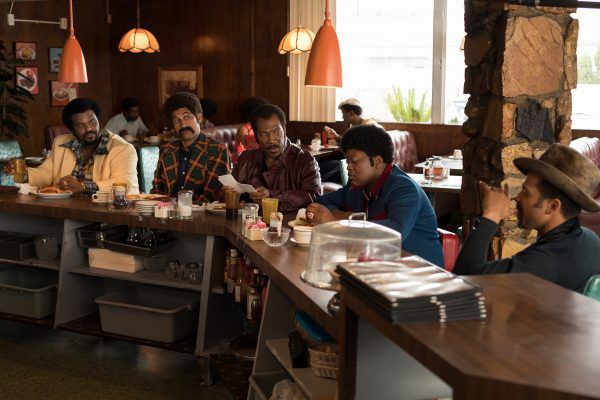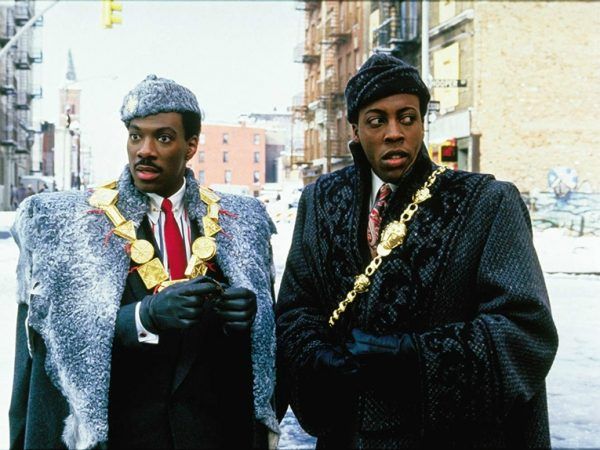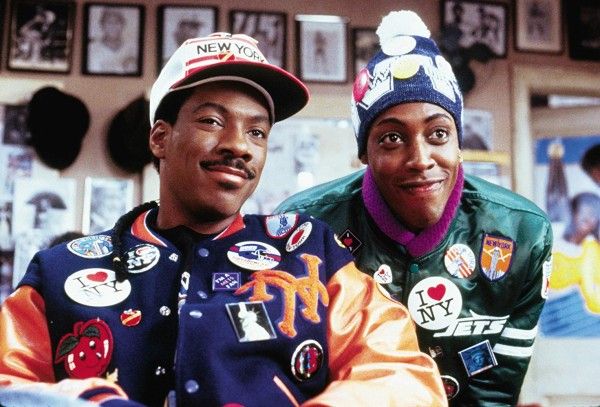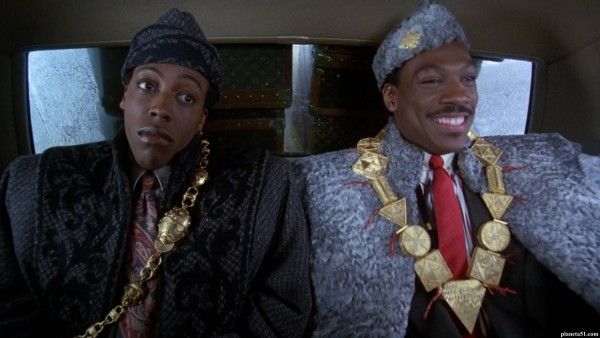With Dolemite Is My Name now streaming on Netflix, I recently sat down with director Craig Brewer for an exclusive interview. If you have yet to see the trailer for Dolemite Is My Name, the crowd-pleasing biopic written by Scott Alexander and Larry Karaszewski is about a struggling comedian Rudy Ray Moore (Eddie Murphy) as he struggles to break through as an entertainer any way he can. One day he comes up with the comic persona Dolemite and we follow his journey from recording albums in his living room to becoming a Blaxploitation success at the box office. It’s an incredible true story, a fantastic film, and Eddie Murphy hasn’t been this good in years. Absolutely recommended. For more on Dolemite you can read Matt Goldberg’s review. The film also stars Keegan-Michael Key, Wesley Snipes, Craig Robinson, Mike Epps, Tituss Burgess and Da’Vine Joy Randolph.
During the interview, Brewer shared some great stories about the making of Dolemite, how they wanted to make a film that Rudy Ray Moore would've appreciated, how Murphy sold Netflix on making the movie, his editing process, deleted scenes, casting Wesley Snipes (who is fantastic in the film), and more. In addition, with Brewer hard at work on the Coming to America sequel, Coming 2 America, he revealed what fans can expect in the long-awaited sequel and where they are in the production.
Check out what Craig Brewer had to say in the player above and below is exactly what we talked about.
Collider: How you doing today?
CRAIG BREWER: I'm doing good. I just flew in from Zamunda.
Are you guys filming that in L.A.?
BREWER: We are filming it in Atlanta right now.
So, you guys have to fly in and fly back?
BREWER: Yeah. Wesley and Eddie and I were just on set and flew out here. It's weird because I refer to Wesley as the General on set because he plays this really crazy character on Coming 2 America. I would talk to him, as the General, and say, "I am actually going back to Los Angeles to see this movie Dolemite Is My Name, starring this fantastic actor-director named D'Urville Martin." So, he would talk to me in the General, "Oh, I have heard of him. Yes. I've heard of this D'Urville." Now, I bump into Wesley and he's just Wesley Snipes.
Does he go method?
BREWER: It's not annoying method. It's fun method. The joy that I have had working with Wesley is that he shows up about an hour before call and he hangs out on the set and he's making everybody feel great. It's been one of the joyous things in my life working with Wesley Snipes. I've been fascinated to see people's response in that because they're like, "Really?"
Let's just say that Wesley appreciates what's going on.
BREWER: Yeah.
He appreciates the work and I think he's in a different space.
BREWER: He is, but I think he's in a true spiritual place with it, with everything in his life. I don't know the specifics of it, but I just know that I haven't yet worked with an actor like Wesley where I see that he is so clearly in a... he's tapping a very special artery that I don't think many people thought of, which is not just comedy, but this larger than life creation of comedic characters. He's done it with D'Urville Martin, but what he's doing on Coming 2 America is mind-blowing. The crew... they come to me. They go, "He is so in the pocket right now."
Jumping into Dolemite... you did a great job.
BREWER: Oh, thank you.
It has to be cool for you because everyone likes the movie. I haven't heard anyone say anything other than, "Oh, that's really good."
BREWER: Yeah. What's nice about it is I think even if there's something... there's always things that one could be critical about. By the way, Larry, and Scott, and I would agree, but I think what I love is that people are understanding that we really wanted to make something that Rudy Ray Moore would've appreciated. If this is going to be the introduction of Rudy Ray Moore to millions of people who didn't know who he was, this is the way to do it. It's funny, what made me think about that was... not that, oh, the way to do it is get me and Larry... what I mean by that is the movie needs to almost feel like it felt for me sneaking in and listening to Rudy Ray Moore records and watching something like Dolemite. It's just a little bit something you shouldn't be doing as a kid, but you can't get enough of it. Even when my 11 year-old daughter, I brought her to see it, and I was worried about, well, there is a lot of swearing and there's some boobs in here, but I feel that the heart of the movie's actually quite sweet. She came up to me afterwards. She said, "I love that movie. I loved Rudy Ray Moore. I loved watching the fight scene when they're making the film." I was like, "That's what I want to happen. I want a bunch of teenagers and kids to go, 'Who's this Rudy Ray Moore cat? I want to know more about him and be like him.'"
I heard... and I'm not sure if it's 100% true... but is it true that you guys, when you went in to pitch Netflix, that Eddie basically did Rudy in the room?
BREWER: Yeah. I wasn't there for it. Larry and Scott... I don't know if you've ever had to see two writers pitch an idea, but they have to rehearse as to who's doing which part of the pitch. Larry and Scott spent a week working on this pitch for Netflix. They went in and, literally, as they inhaled to pitch, Eddie walks in, does 20 minutes of Rudy Ray Moore, leaves, and they said, "Well, get to writing." They didn't say a damn thing. They didn't say anything. Just Eddie came in and did it and they were like, "Well, obviously, we're making this movie. So, go off and do it." Larry and Scott didn't say a damn thing.
That's amazing. I always like talking to directors about editing because that's the final rewrite.
BREWER: Yeah. I'm glad you're bringing that up because it was...
How long was your first cut compared to the finished film?
BREWER: Our first cut was two hours and 45 minutes. That's not the cut that we showed in front of an audience. That was-
Like the assembly?
BREWER: The assembly was about 2:45, but luckily Billy and I have now worked on... all my films have been edited by Billy Fox. For the first time in my life, and I think it was because of all of my work on Empire, I had a better handle on the process. I could look at two hours and 45 minutes and go, "We've got issues in the second reel. We totally have the ending. We've even got the beginning. We're going to have to make choices about these scenes because I think they're repetitive. We really could get into it faster..." because we had this shorthand between the two of us, but we also knew... it's funny... we had this code between us. He would go, "Is this Black Snake Moan?" I was like, "Yeah. That's Black Snake Moan." He'd go, "Is this Whoop That Trick?" I'd go, "Yeah. That's Whoop That Trick." Black Snake Moan would be like what's that really difficult song that we had to do with Sam Jackson and Christina Ricci and have to spend probably a week on this one sequence, just this one sequence right here that we were like, "This is going to be the hard one." What's the one where we need to get everybody excited and see the creative process happening, when the blood starts pumping into the audience? Ah, that's that Whoop That Trick moment. That's him learning to... he was listening to the tape and writing down the lyrics. Then, you see him coming up with the character and then performing it. It's like, you need to give the promise of, oh, is that what he's creating? This. This character. It's going to have this type of vibe. It's going to have this type of rhythm. More and more, I remember him joking. He goes, "I bet you this movie's going to be an hour and 57 minutes," because all our movies have been an hour and 56 minutes.
That's hysterical. Did you end up having a lot of deleted scenes, or did you have a lot of fat taken out of scenes?
BREWER: Well, there was probably a couple of other beats of white establishment, saying no to Dolemite, saying no to seeing the movie Dolemite, or to distributing the movie Dolemite. What we found, though, is that there was this one day... and I'm going to get emotional talking about this day... but there was this one scene in the movie where Eddie is on the phone getting rejected. It's after he's made the movie and he comes running down and he's listening to somebody say, "I don't want to distribute your movie." We did this push in on him. I didn't get cutty with it. I just let him seem small in the frame as I kind of creeped up on him. It was the last time I had John Singleton on set with me. John was sitting there watching this moment of this independent filmmaker basically getting rejected and when I called cut, John would kind of punch me in the arm if he liked something that he saw. He's like, "You're not covering it? You're not coming in and doing it?" I was like, "No, I think this is it." He was proud that I was going to keep it like this. He was like, "That's the truth, man. That's truth. That's what you were dealing with when I met you is that everybody liked reading Hustle and Flow and saying no and no and no." That's that moment. So, when we saw that scene, I was like, "I think this does more than some of those other scenes where you actively saw people say no." It was better to see the heartbreak on his face than, necessarily, see people do it. So, sometimes you get into a movie and you don't know about those moments until you start laying them out. It's hard because you remember the day. You remember, oh, I thought this was a funny scene. Then, you start seeing what the movie is, which is, like you said, it's the next draft of the story.
One of the things about Netflix, which I'm wondering when it's going to happen, is they have all this great technology, but they never release deleted scenes. They never do commentaries. It's just the movie.
BREWER: Well, let me tell you. I have a theory on that because this is what was very interesting about working with Netflix. There was a scene in the movie I didn't know should be in or out. We were all debating whether or not the scene should be in or out. Nick Nezbit and all the great people at Netflix, they're like, "Well, we think the scene works. We think it should be in." I said, "Yeah, but I don't know. I don't think it should be in." Some other people on our team are thinking it shouldn't be in. They said, "Oh, okay." That was it. I was like, "Oh, wait a minute. That's not how we've been raised. You need to argue with me." They said, "Well, how about we do this. Do you want us to have two separate previews, one with the scene and one without the scene, so we can better arm you to make a decision?" I'd be like, "What fantasy place is this?" You know what it is? The movie's the movie. When I read that The Irishman is three hours and, what, 30 minutes? 40 minutes, or something like that? I was like... because Marty doesn't want anything out and Netflix isn't the place to argue with him, but they would arm him with the tools to make the right decision. So, you're seeing what ultimately the filmmakers want you to see. They're that supportive with it. I've never had, really, a relationship like that.
I don't mean in a negative way. I'm saying-
BREWER: Oh, totally.
I thought Eddie did such an awesome job in this movie. If there's deleted scenes with Eddie, I want to see them. But the thing is, they generally don't release them.
BREWER: Well, it's funny because I have a friend I went to high school with and she does DVD and Blu-ray. She produces them for Paramount. Whereas I thought commentaries would be the thing that really makes people buy Blu-rays or DVDs, it's actually the deleted scenes. So, I feel that it's more... just my personal opinion... that it's almost more of a marketing thing. If you really ask directors, sometimes they don't want you to see those deleted scenes.
Oh, absolutely. I've seen some deleted scenes that are terrible and should've never been released.
BREWER: But then again, doesn't Netflix... because when I was watching They’ll Love Me When I'm Dead and the Orson Welles documentary-
Sure.
BREWER: I thought there was some other-
There was a doc and the movie all together.
BREWER: Well, there was a doc and movie, but there were additional pieces, where if you went into the more button on Netflix-
I might have missed this. Did you end up having a lot of deleted scenes, or is just little bits?
BREWER: Little bits because we filmed a lot that were part of the filmmaking montage or different parts of the Chitlin' Circuit. Then, we found that sometimes this scene kind of felt like this scene, so let's just get into the meat of the storytelling. But it wasn't like there was a ton of material that was cut out of the movie.
You got to film this in Los Angeles.
BREWER: Yeah.
Nothing films in L.A. anymore.
BREWER: It was so great.
I was going to say, the thing about that, how tough was it? Did you get the California rebate?
BREWER: I don't think we did. No.
So, L.A. just worked out?
BREWER: Here's yet another good thing about working with Netflix. You told them that the movie took place in Los Angeles and that was the end of the discussion. There wasn’t this like, oh, well it'd be cheaper if you could shoot Toronto for Los Angeles because the rebate would make the budget more palatable. They were like, "No, it takes place in Los Angeles." We filmed at a lot of the same locations that Dolemite and Human Tornado took place in. It's wild.
It's crazy.
BREWER: Like the kung-fu scene where he's doing the really whack kung-fu.
In the driveway?
BREWER: In the driveway. That's the same house from Dolemite. Same house. We were there with Nick von Sternberg that day, who's the director of photography in the movie that's portrayed in the movie. We brought him out to set that day. It was like, what, 30, 40 years later that he's at that same house and here's Eddie Murphy re-creating something that he shot way back then? It was a wild experience.
Everyone loves Eddie Murphy. Did you find that with this movie a lot of people wanted to visit set because it's Dolemite and it's Eddie Murphy?
BREWER: Yeah. Not only that, but people wanted to be in the movie. People just said, “I'll do anything I can to get in this movie. What do I have to do?” So, to some extent, having that abundance of riches of talent knocking on the door, we had to be very cautious about how we did it because, one thing that I'm particularly proud about the movie is that we have a lot of these funny people, but we're not milking them to be funny in every moment. I love Craig Robinson's performance in this because of how understated in places he is. The same with Titus. The same with Mike Epps is that you've got these people who are known for making you laugh, but we don't insist that they entertain you every second in this movie. They're not playing for yucks, you know? They're characters.
Sure.
BREWER: They're real people. I'm particularly proud of the ensemble of the movie that's around Eddie in it. Well, I'll you where it really happened was with Wesley because everyone wanted to play D'Urville Martin. A lot of the casting lists that were being put in front of me were all of the people who are hot right now. I remember telling Eddie, I go, "Eddie, I don't feel good about these younger, newer, fresher faces doing this movie, which is essentially about people who have been around and now are doing one last hurrah." I go, "I need someone who's going to share a frame with you. Who could that be?" He said, "Well, it'd have to be someone like Wesley." Man, after I heard that, I met with Wesley. We had dinner. I was like, "I can't see anybody else but Wesley Snipes for this." So, going back to Netflix and everybody was like, "We want Wesley Snipes." They were like, "Wow, that's such an inspired idea. It's none of these people that we put before you." I was like, "Yeah, but this is who we're going with." Now, he's amazing.
Agreed.
BREWER: So, a lot of that energy that was coming towards us, of people that wanted to be in it, it also gave us the opportunity to go, "Okay, but what's the right decision?"
When you have Eddie leading the charge, you can do almost anything and people are going to... you know what I mean.
BREWER: Yeah.
People are going to seek it out.
BREWER: But then there's also new people that come along. I've worked with Da'Vine Joy Randolph on Empire and I just knew that she was a star waiting to happen. So, to have all of these veteran people in the movie that were so amazing, but also being able to bring somebody new, who I think is just going to be a star after this movie, it was really special.
She's also awesome in it. Okay. I want to jump into Coming 2 America, if you don't mind. I am curious, how did the project land in your lap? Was it because of your relationship with Eddie and how well this worked out?
BREWER: Coming 2 America had been in development and there had been a script that the original writers, Bloustein and Sheffield, had written and then Kenya Barris came along and did a reworking of it. Then, really, it was Eddie that brought me the project. I think that not only that, but I've made four pictures with Paramount Pictures.
Sure.
BREWER: I think that they kind of saw that the spirit of the movie was kind of in my wheelhouse a little bit. They got an early screening of Dolemite.
I'm sure that helped.
BREWER: They saw it very clearly. So, that's how the project came to me.
I posted something Coming 2 America at Cinema Con and I could not believe the level of interest that came out for the movie.
BREWER: When the trailer came out? Right.
Just that little... I tweeted something and it exploded. I'm just curious, are you guys aware of the level of interest in it?
BREWER: We are. It's both exciting and daunting, but I feel like we're doing the right thing with it. I really do. We know that it means a lot to a lot of people. We want it to be really really funny, but we also need it to have some heart and soul because it means so much to so many people.
Well, one of the things that is so beloved about the first one is Eddie and Arsenio and people playing multiple characters and having fun. Is that the case in-
BREWER: It's all happening again.
Right. I love it.
BREWER: It's all happening again. I'll tell you what, having just wrapped shooting with James Earl Jones, was just one of the best things that has ever happened in my life. Yes. He's so wonderful. To see King Joffer again... you got to remember, the thing that I think what I hope people will like when they ultimately see Coming 2 America is that it's 30 years after that fairytale ended. Not ended, but the fairytale of Coming to America we saw. That we saw a young couple come together in a fairytale. Well, now they're parents. Now they're dealing with what happens when you're 30 years later. To have the alchemy of what's happening in the audience, where I am bringing my teenage children to see Coming 2 America... when I was their age when I saw Coming to America... the same thing that's happening in the audience is happening on the screen. It's really refreshing to see.
I have to ask you about James Earl Jones and stepping on set. I mean, it's James Earl Jones. What is it like, A, directing him and, B, when he's walking on set to play this character, do you get that sense? Do you feel that energy?
BREWER: Yeah. The mixture is that there's reverence because it's James Earl Jones, but there's also such intense love that there would be times that I would see him do a line of dialogue and I would just want to look back at the crew and to see that many just grinning faces, just taking in the joy of watching him do King Joffer again was something I'll never forget.
For people that aren't familiar with the... how have you been describing the film to people, besides what you just said about 30 years later?
That's pretty-the best way to do it. Akeem's in a... he's got to start thinking about being a king now and all the troubles that come with being a king.
My last thing for you is where are you in the production schedule? Are you just filming in Atlanta, or are you filming other places?
BREWER: Primarily in Atlanta.
Sure.
BREWER: With occasional trips to Zamunda.
Where are you in the shooting schedule?
BREWER: I think we're about half way.
Congrats on this.
BREWER: Thank you.

